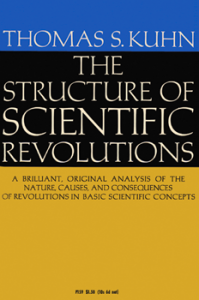Scientific Theory on the Couch
by Randall H. Paulsen, MD

The Structure of Psychic Revolutions: A Psychoanalytic Account of Kuhnian Science by Scott C. Taylor was awarded BPSI’s Silberger Paper Prize and presented at BPSI in 2018, with Randall H. Paulsen, MD, as the invited discussant. Dr. Paulsen’s response to Taylor’s article, Scientific Theory on the Couch, was published along with Scott C. Taylor’s contribution in Fall 2019 issue of American Imago.
Professor Taylor examines the history of Kahn’s 1962 publication The Structure of Scientific Revolutions and the effect it made on the scientific history and psychoanalytic traditions, arguing that psychoanalysis has also revolutionized science. Scott C. Taylor, MA, LSW, is an adjunct instructor at Fordham University, Graduate School of Social Service (GSS), and adjunct philosophy professor at New Jersey City University. He received his MA in philosophy with a concentration in psychoanalysis from the New School for Social Research and his MSW from Fordham University, GSS. His research focuses on the intersections between pragmatism, philosophical hermeneutics, and psychoanalysis. He has presented papers in these areas both in the US and Europe. In addition to his scholarly work, he is a psychotherapist at the Institute for Personal Growth in Jersey City, NJ, and a career firefighter for the Jersey City Fire Department where he also serves as a member of the department’s critical incident stress management team.
In his response to Scott C. Taylor’s paper, Dr. Paulsen writes about the experience of individuals in psychoanalysis, reflects on Hans Loewald’s connection with Thomas Kuhn and psychoanalysis, and examines whether psychoanalysis has ever been a “normal science”, concluding that “there needs to be a place for the psychoanalytic heartbeat within the body of science.” Randall H. Paulsen, MD, is a psychiatrist, Training and Supervising Psychoanalyst, and past President of BPSI. He is an Assistant Professor of Psychiatry at Harvard Medical School and currently supervises and consults at Brigham and Women’s Hospital. His career has been focused on applied psychoanalysis, in directing inpatient and day hospitals at Tufts NEMC and Mt. Auburn Hospital (1981–1987), in developing primary care psychiatry as a component of Health Care Associates at BIDMC (1987–2000), and in facilitating a long-term Balint group for physicians. He was the mind-body consultant at The Osher Clinical Center at BWH where he also led Mindfulness-Based Stress Reduction courses (2002–2018). He views psychoanalysis as a subjective science in health-care, human development, and relationships—both individual, group and institutional. He has a private practice of psychoanalysis in Lexington.
Both papers are available online in fulltext:
Taylor, S.C. (2019). The Structure of Psychic Revolutions: A Psychoanalytic Account of Kuhnian Science. American Imago76(3), 381-404. doi:10.1353/aim.2019.0023.
Paulsen, R. (2019). Scientific Theory on the Couch: A Response to Scott C. Taylor. American Imago76(3), 405-411. doi:10.1353/aim.2019.0022.
Previous Posts:
Bernard Edelstein, MD (2019). Introduction: Stumbling on our Past, Reflections on James Baldwin’s “My Dungeon Shook”. American Imago, 76(3): 295-300.
Don Lipsitt, MD (2020). Is Today’s 21st Century Burnout 19th Century’s Neurasthenia? The Journal of Nervous and Mental Disease, 207(9): 773-777, September 2019.
Elsa Ronningstam, PhD (2020). Internal Processing in Patients with Pathological Narcissism or Narcissistic Personality Disorder: Implications for Alliance Building and Therapeutic Strategies. Journal of Personality Disorders, 34 (Suppl): 80-103.
Dan Jacobs (2019). Three’s a Crowd: Stella’s Pregnancy and the Arrival of an “Other” in A Streetcar Named Desire. International Journal of Applied Psychoanalytic Studies. 16:3, 174– 180.
Fred Busch (2020). The Clinical Significance and Problems of a Traumaticentric View. In Trauma and the Destructive-Transformative Struggle: Clinical Perspectives, edited by Terrence McBride and Maureen Murphy. Routledge, p. 187-194.
Jeremy P. Nahum (2019). Louis Sander: Remembrances and Reflections on His Contributions.
James M. Herzog (2019). “Polarity, Paradox and the Organizing Process in Development”; Parent-Infant Psychotherapy and Child Analytic Technique: In Honor of Louis Sander. Psychoanalytic Inquiry, 39:1, 98-108.
Lora Heims Tessman, PhD (2019). Momentums of Meeting. Psychoanalytic Inquiry, 39 (1): 88-97.
Jane Hanenberg, EdD (2019). Review of the book Demons in the Consulting Room: Echoes of Genocide, Slavery and Extreme Trauma in Psychoanalytic Practice ed. by Adrienne Harris, Margery Kalb, and Susan Klebanoff. American Imago 76(2), 274-278.
Paola M. Contreras, PsyD (2019). Working with the Human Trafficking Survivor: What Counselors, Psychologists, Social Workers and Medical Professionals Need to Know. In Working with the Human Trafficking Survivor: What Counselors, Psychologists, Social Workers and Medical Professionals Need to Know, edited by Mary C. Burke. Routledge, pp. 61-80.
Click here to see a full archive of featured papers. All articles can be requested from the library.

